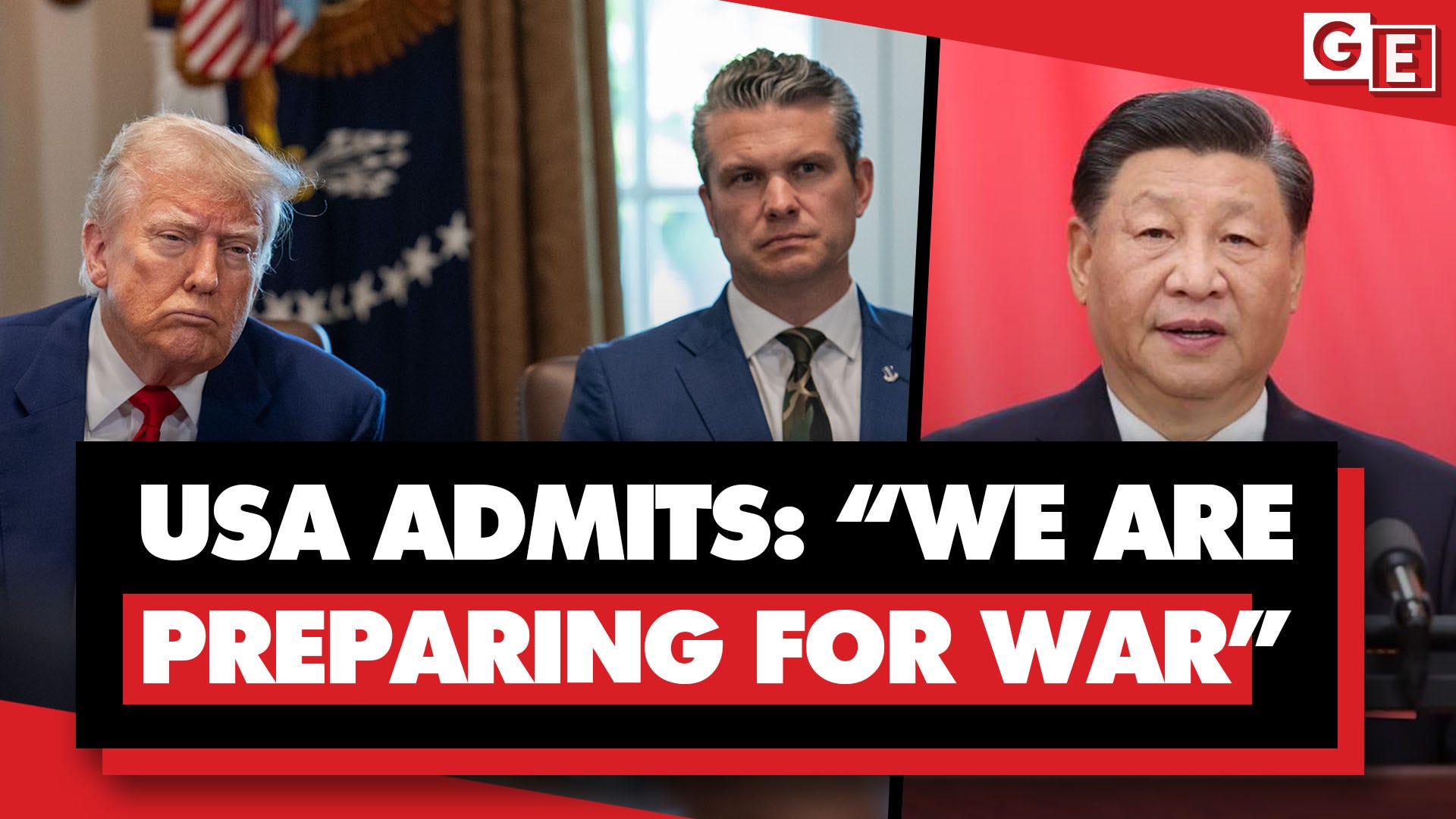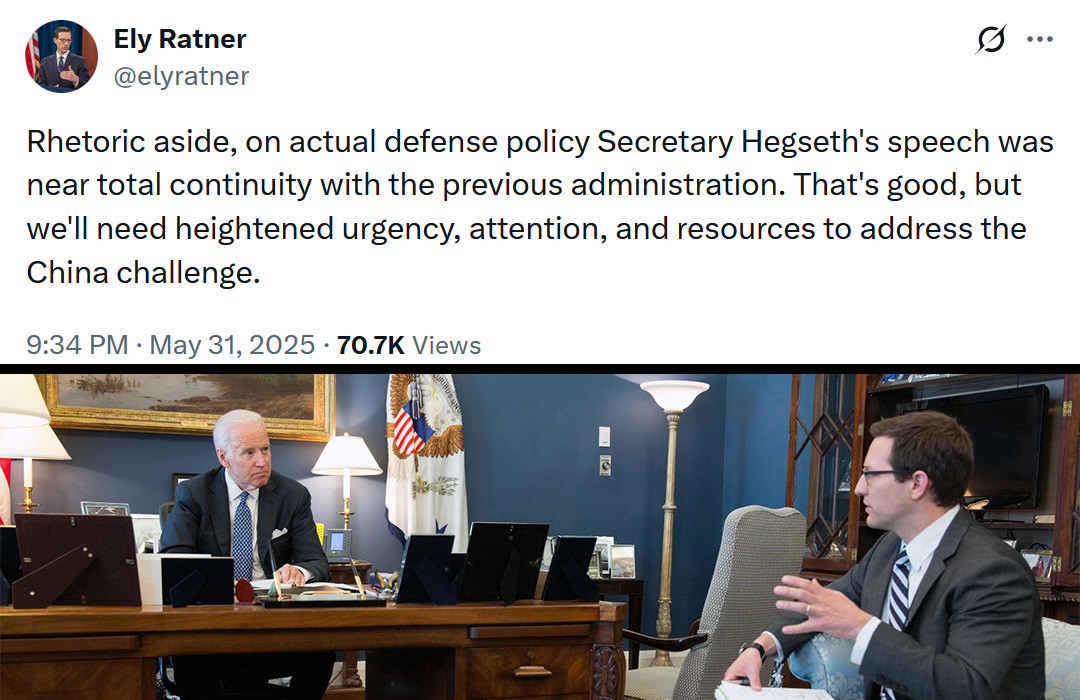'We are preparing for war' with China 'threat', says US Defense Secretary Pete Hegseth
US Secretary of Defense Pete Hegseth delivered a hawkish speech at the Shangri-La Dialogue 2025 summit, demonizing China as a “threat”, saying, “We are preparing for war” in the Asia-Pacific region.
US Secretary of Defense Pete Hegseth delivered an extremely hawkish speech in which he demonized China as a "threat" and said, "We are preparing for war".
"Those who long for peace, must prepare for war. And that's exactly what we're doing. We are preparing for war, in order to deter war — to achieve peace through strength", Hegseth stated.
The top Donald Trump administration official made these aggressive remarks at the Shangri-La Dialogue 2025, a summit held in Singapore on 31 May.
"The threat China poses is real, and it could be imminent. We hope not, but it certainly could be", Hegseth claimed, indicating that the Pentagon was preparing for a war over Taiwan.
"Beyond our borders and beyond our neighborhood, we are reorienting toward deterring aggression by Communist China", he stressed.
The message of Trump's Pentagon: war is peace
The Trump administration's Pentagon has essentially pushed the message "war is peace".
Hegseth has incessantly reiterated the slogan "peace through strength".
"President Trump said it himself [in May] in Riyadh – and will never hesitate to wield American power swiftly and decisively if necessary. That is re-establishing deterrence", the defense secretary emphasized in Singapore.
Hegseth is a war hawk and a religious fundamentalist. He made his name as a former host on the conservative TV network Fox News, where Trump discovered him.
In 2020, Hegseth published a book called “American Crusade”, in which he proudly identified as a “crusader” and wrote that the US right wing is waging a “holy war” against China, the international left, and Islam.
“Communist China will fall—and lick its wounds for another two hundred years”, he promised in the extremist book.
Trump admin pressures Asia-Pacific countries to minimize "economic cooperation with China"
In his speech in Singapore in May 2025, Pete Hegseth noted that it was his second time in his four months serving as secretary of defense that he had visited the Asia-Pacific region (which Washington has sought to rebrand as the "Indo-Pacific").
In March, Hegseth traveled to Japan and the Philippines, where he threatened China and boasted of US “war-fighting” preparations and “real war plans”.
At the Shangri-La Dialogue conference, Hegseth half-jokingly threatened the Asia-Pacific region with his endless presence.
"I'm certainly proud to be back into the Indo-Pacific for the second time as the secretary of defense. And I'm going to keep coming back, and back, and back again. You're stuck with me", he said.
The US defense secretary pressured nations in the region to minimize their economic relations with China.
The Trump administration essentially told countries that they must choose between either the United States or China -- that they can't have good relations with both sides, because a war could be coming soon.
Hegseth said (emphasis added):
Facing these threats, we know that many countries are tempted by the idea of seeking both economic cooperation with China and defense cooperation with the United States. Now that is a geographic necessity for many. But beware the leverage that the CCP seeks with that entanglement. Economic dependence on China only deepens their malign influence and complicates our defense decision space during times of tension.
China opposes hegemony, while the US empire seeks it
Defense Secretary Hegseth claimed in his May speech in Singapore that, supposedly, "China seeks to become a hegemonic power in Asia. No doubt".
This is false. China has consistently emphasized, over decades, that it does not seek hegemony. In fact, Beijing does not want any country to have hegemony.
Principled opposition to hegemony has been a constant since the founding of the People's Republic of China (PRC) under Mao Zedong in 1949, through the Reform and Opening Up initiated by Deng Xiaoping in 1978, and into the New Era launched by President Xi Jinping in 2012.
The Chinese government has always stressed what it calls its "unequivocal commitment to supporting other developing countries in their efforts to defend national sovereignty, develop national economy and fight imperialism, colonialism, and hegemonism”.
In a speech at the United Nations General Assembly in 1974, Deng Xiaoping stated, "If one day China should change her color and turn into a superpower, if she too should play the tyrant in the world, and everywhere subject others to her bullying, aggression, and exploitation, the people of the world should identify her as social-imperialism, expose it, oppose it, and work together with the Chinese people to overthrow it".
In fact, when the PRC normalized diplomatic relations with the United States and Japan in the 1970s, a source of diplomatic tension was China's insistence that, in the joint statements signed by Beijing and Washington and Beijing and Tokyo, there had to be an "anti-hegemony" clause.
It is actually the United States that has consistently sought to impose its hegemony on the rest of the world.
This was spelled out clearly in a 1992 document published by the US Department of Defense, known as the Wolfowitz Doctrine (because it was co-written by Paul Wolfowitz, who then served as US under secretary of defense for policy, before later returning as deputy secretary of defense under George W. Bush).
The Pentagon's Wolfowitz Doctrine stated (emphasis added):
Our first objective is to prevent the re-emergence of a new rival. This is a dominant consideration underlying the new regional defense strategy and requires that we endeavor to prevent any hostile power from dominating a region whose resources would, under consolidated control, be sufficient to generate global power. These regions include Western Europe, East Asia, the territory of the former Soviet Union, and Southwest Asia.
The Trump administration's foreign policy is still consistent with much of the Wolfowitz Doctrine. Although Trump has de-prioritized Western Europe and the territory of the former USSR, he has dedicated significant resources to US military operations in East Asia and Southwest Asia (also known as the Middle East).
In fact, the main theme of Hegseth's speech was that the Pentagon will not accept China challenging US dominance in the Asia-Pacific region.
"We will not be pushed out of this critical region", Hegseth said, in a clear message to Beijing.
This was the US empire stating clearly that it seeks to impose its hegemonic control over East Asia.
Bipartisan warmongering in Washington
This aggressive anti-China stance is bipartisan in Washington.
A former top Joe Biden administration official said he agreed with the thrust of the anti-China policy pursued by Pete Hegseth, a right-wing extremist and religious fanatic.
Ely Ratner, who served as the assistant secretary of defense for Indo-Pacific security affairs in Biden's Pentagon, wrote approvingly on Twitter/X, "Rhetoric aside, on actual defense policy Secretary Hegseth's speech was near total continuity with the previous administration”.
"That's good, but we'll need heightened urgency, attention, and resources to address the China challenge", Ratner added.
Biden's neoconservative Secretary of State Antony Blinken had also maintained a hardline anti-China position.
In a speech in 2022, Blinken announced what was essentially a containment policy targeting China.
“We cannot rely on Beijing to change its trajectory. So we will shape the strategic environment around Beijing”, he said.
Blinken added, “The scale and the scope of the challenge posed by the People’s Republic of China will test American diplomacy like nothing we’ve seen before”.





Thank you Ben Norton for your always well written and researched rtitcles. The fallacy inherent in Hegseth's and others approach to China is blatantly obvious. Arming yourself for peace is stupid. Dialogue and diplomacy is what is needed. China wants to expand its trade, and does not seek hegemonic powers. It is important that you point that out so well.
When oh when will the USA stop interfering and making wars? This one they will not win.
The last war the US won was Grenada!